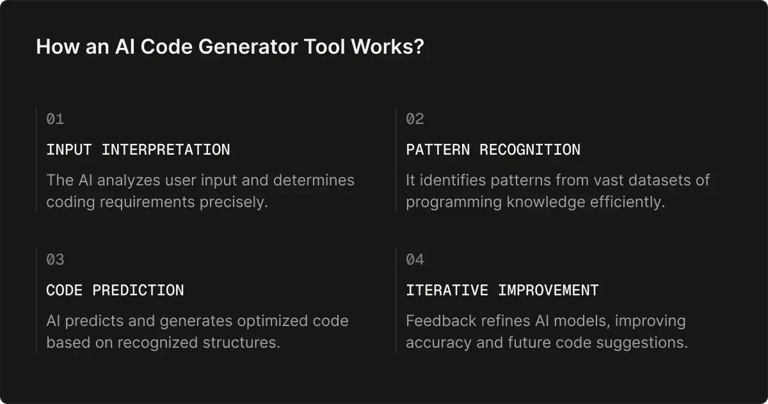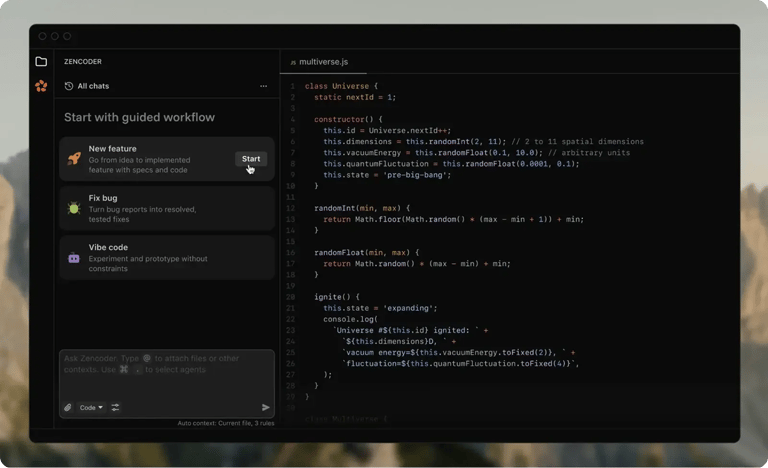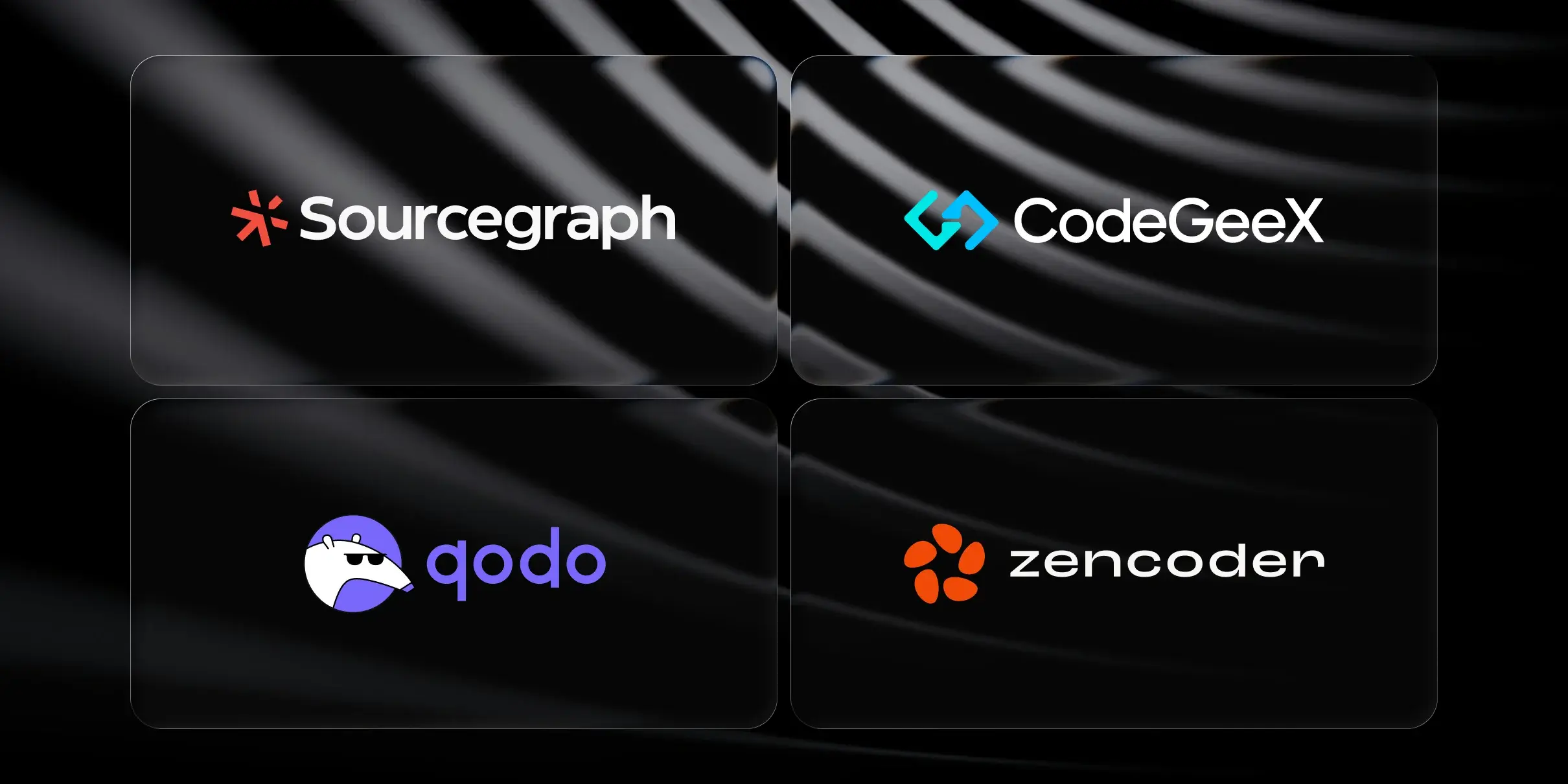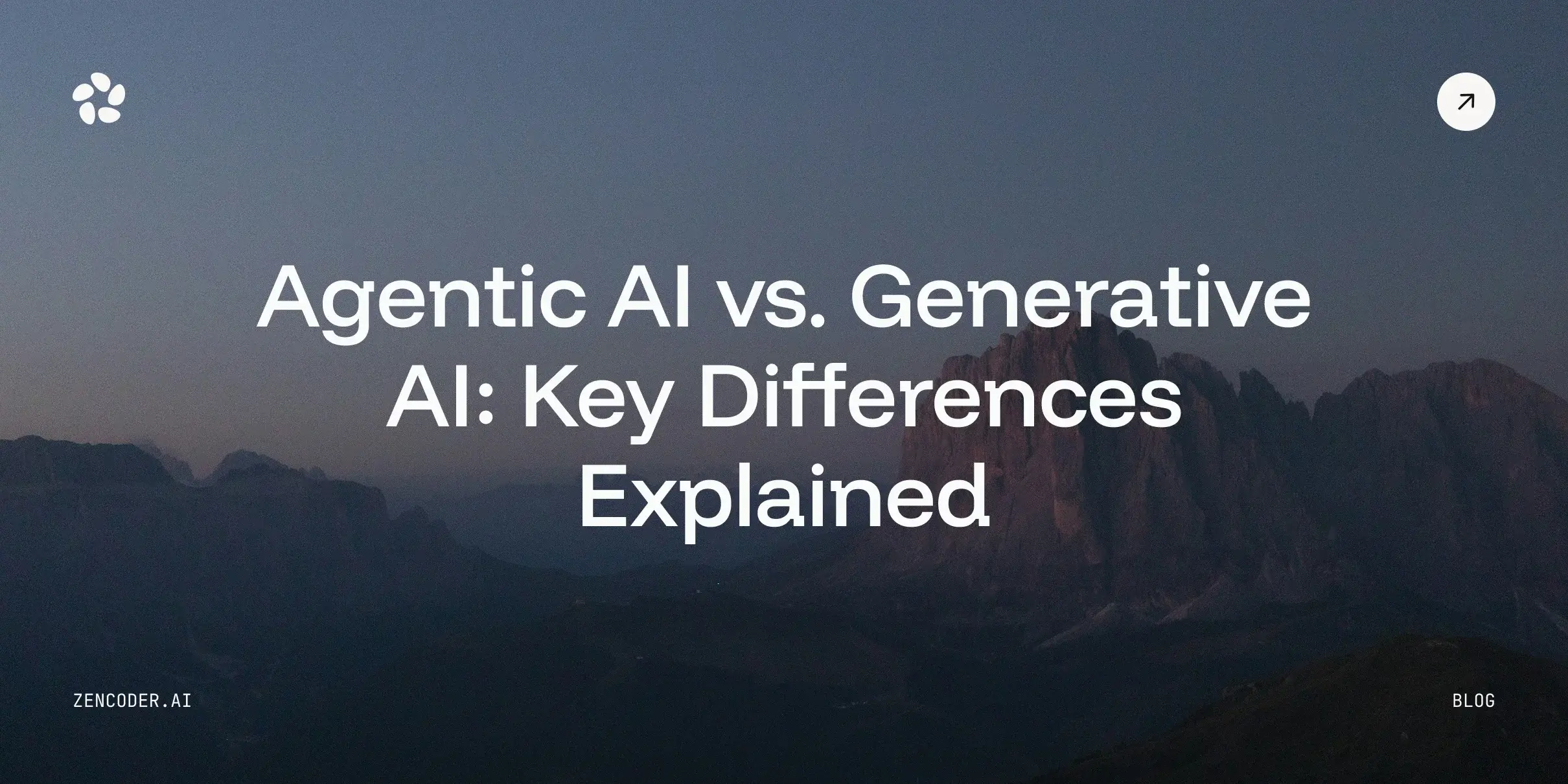Software development is changing rapidly, and AI code generation is at the forefront of this transformation. In 2021, only early adopters used AI software development tools, while Google’s 2025 DORA report shows that 90% of professionals use them today.
Developers are constantly seeking ways to save time, reduce repetitive tasks, simplify complex workflows, and improve code quality. Tools like Zencoder make this possible, enabling teams to deliver value faster than ever.
In this article, we’ll explore real-world use cases of AI code generation. You’ll find out how AI code generators have helped well-known companies overcome common coding challenges and reach impressive levels of productivity.
What Is AI Code Generation and How Does It Work?
AI code generation tools can predict and generate code according to developers’ input. These tools can write entire functions, complete code, create optimized snippets, and even debug code automatically.
At the heart of AI code generators are advanced machine learning models, which are based on deep learning architectures like neural networks. These models are trained on massive datasets that encompass various programming languages, coding styles, and even code comments. They learn the intricate patterns and rules that govern how code is structured and how different elements interact.
Still, AI doesn't just regurgitate code that it’s seen before. Instead, it suggests code that is most likely to align with your requirements.
The way it operates is simple. You give it a natural language description, a partial code snippet, or even just a function signature — and the AI responds with the code accordingly.
The beauty of AI code generation is that it can adapt to your preferences and coding style. As you use these tools, they learn from your feedback and interactions, becoming more personalized and effective over time.
Source: DataScienceDojo
How Zencoder Simplifies Coding
Zencoder stands out by offering features that target key pain points in software development, such as:
- Automating repetitive tasks, such as CRUD operations
- Generating fully functional API endpoints
- Producing scripts for continuous integration and deployment (CI/CD)
- Creating optimized, secure code snippets
By integrating Zencoder into your workflows, your team can significantly reduce manual effort and focus on business-critical problems and innovation.

Source: Zencoder
Common Applications of AI Code Generation
Before diving into specific examples, here’s an overview of how companies can benefit from AI code generation today:
- Code modernization: AI can analyze an entire legacy codebase and then translate it into a modern language directly. Alternatively, it can provide specifications in plain English for developers to use when rewriting code. In either case, it saves companies a lot of resources.
- Database interactions: AI can also assist in database interactions, which often involve complex SQL queries and ORM models. AI tools can generate schemas, migration scripts, and CRUD operations from natural language prompts, thus speeding up the process and reducing errors.
- API development: Creating APIs is hard work and typically entails an array of repetitive tasks, such as setting up routes and validating data. AI code generators can automate a lot of this process, and it’s especially valuable for microservices architectures where dozens of endpoints are involved.
- Test generation: Writing tests is necessary but tedious. AI tools can help by analyzing code paths and automatically generating test cases, including edge cases and error scenarios. Besides saving time and effort, AI ensures greater coverage.
- CI/CD pipeline configuration: With AI, companies no longer need to seek experts in specific platforms to set up integration and deployment pipelines. AI code generation tools can produce configurations from high-level requirements and handle build steps, testing, and logic across multiple platforms.
- Security enhancement: AI can scan code, detect security issues, and offer fixes automatically, handling everything from SQL injection risks to insecure authentication patterns.
- Code documentation: AI tools can analyze code and generate docstrings, READMEs, API documentation, and inline comments.
- Code review and refactoring: Once it analyzes existing code, AI can identify code smells and suggest performance optimizations, helping teams maintain code quality across a large database.
AI Code Generation Use Cases — 7 Examples With Zencoder
AI code generators help companies accelerate development, simplify workflows, save time, and reduce the number of costly errors. Given the many advantages of AI, it’s evident why so many companies rely on it today. Tech giants are no different — more than 30% of Google’s new code was created with the help of AI.
Sections below will take a closer look at a few use cases of AI code generation and their impact. They’ll include code snippets in Zencoder to help you understand how to implement the solutions yourself.
#1: Optimizing Legacy Code Refactoring
The Problem
Refactoring legacy codebases is a daunting task. Legacy code is often complex, poorly documented, and tightly coupled, and thus difficult to understand and modify. Transitioning to modern frameworks or adopting microservices architectures often requires significant effort and carries risks if not done carefully.
How AI Code Generation Helps
Zencoder analyzes your legacy code and suggests optimized, modular structures. It can identify code smells, suggest improvements, and even automate aspects of the refactoring process. This helps you break down monolithic codebases into smaller, more manageable components.
As a result, you get better code readability and modularity, easier maintenance and scaling, and lower chance of technical debt.
Original Python function:
|
def process_data(data): # Original code block pass |
Refactored by Zencoder:
|
def validate_data(data): # New validation logic pass def transform_data(data): # Transformation logic pass def process_data(data): validate_data(data) transformed = transform_data(data) return transformed |
Real-World Use Case: Morgan Stanley
Financial giant Morgan Stanley uses AI code generation to modernize legacy code. Its DevGen.AI tool, which is built on OpenAI’s GPT models, translates code in older languages like Perl into plain language specifications that developers can use to rewrite the code.
DevGen.AI has processed over 9 million lines of code and saved about 280,000 hours of development time within five months of its January 2025 launch.
#2: Streamlining Database Interactions
The Problem
Interacting with databases often involves writing complex SQL queries and managing ORM models. When manual, this process is labor-intensive and error-prone, especially when you’re dealing with intricate database schemas. It requires a deep understanding of the database structure and careful attention to detail to avoid inconsistencies and bugs.
How AI Code Generation Helps
Zencoder simplifies database interactions by generating database models and functions for CRUD operations, i.e., creating, reading, updating, and deleting data. This reduces manual SQL writing and ORM management, minimizing errors and improving consistency. Zencoder can also generate database migrations, so it makes it easy to evolve your schema over time.
Here’s an SQLAlchemy model generated by Zencoder:
|
from sqlalchemy import Column, Integer, String, create_engine from sqlalchemy.orm import declarative_base
Base = declarative_base()
class User(Base): __tablename__ = 'users' id = Column(Integer, primary_key=True) name = Column(String, nullable=False) email = Column(String, unique=True, nullable=False)
# Database engine setup engine = create_engine('sqlite:///app.db') Base.metadata.create_all(engine) |
Real-World Use Case: Uber
Uber built QueryGPT, an internal tool to generate SQL queries from natural language prompts. The tool automatically handles around 1.2 million interactive queries per month, cutting the authoring time from 10 to only 3 minutes.
#3: Accelerating API Development
The Problem
Creating APIs can be a tedious and time-consuming process. You often find yourself writing the same boilerplate code repeatedly—setting up routes, handling HTTP requests and responses, and ensuring data validation. Manually managing these aspects can lead to inconsistencies in your API design and implementation, potentially causing issues down the line.
How AI Code Generation Helps
Zencoder automates these repetitive tasks to save you time and effort. It can generate entire API endpoints, including request handling, validating data, and returning responses. This allows you to focus on your application’s core business logic and API functionality. Zencoder also defines API routes and generates documentation automatically, ensuring consistency and fewer errors.
Here’s a Python RESTful API snippet generated by Zencoder:
|
from flask import Flask, request, jsonify app = Flask(__name__) @app.route('/users', methods=['POST']) def create_user(): data = request.json if not data.get('name'): return jsonify({'error': 'Name is required'}), 400 # Logic to save user return jsonify({'message': 'User created successfully'}), 201 if __name__ == '__main__': app.run(debug=True) |
#4: Automating Unit Test Generation
The Problem
Writing unit tests helps ensure code quality and prevents regressions, but it’s tedious. Developers often find themselves writing repetitive test cases, which can decrease productivity and tempt them to skip testing altogether. Ultimately, this results in lower code quality and an increased risk of bugs.
How AI Code Generation Helps
Zencoder automates unit test generation, saving time and ensuring comprehensive test coverage. By analyzing your code, Zencoder identifies different code paths and generates test cases that cover a wide range of scenarios. This helps you catch bugs early in the development process and maintain a high level of code quality.
Unit test for a Python function:
|
import unittest from app import add_numbers class TestAddNumbers(unittest.TestCase): def test_add_positive_numbers(self): self.assertEqual(add_numbers(2, 3), 5) def test_add_negative_and_positive(self): self.assertEqual(add_numbers(-1, 1), 0) def test_add_zeros(self): self.assertEqual(add_numbers(0, 0), 0) if __name__ == '__main__': unittest.main() |
Real-World Use Case: JP Morgan Chase
JP Morgan Chase developed an internal LLM called LLM Suite. The model is tailored for specific purposes, including writing unit tests, and it allows the company to safely integrate AI into its operations and maintain high standards of security and compliance.
Potential Use Case: Testing Edge Cases for E-Commerce
Imagine a function that calculates discounts based on factors like customer type, purchase amount, promotional codes, and referral codes. Manually writing unit tests for all possible combinations would be overwhelming.
AI code generation tools could automatically generate tests that cover edge cases, such as:
- A new customer with a high purchase amount and a valid promotional code
- An existing customer with a low purchase amount and an expired promotional code
- A customer with invalid input data (e.g., negative purchase amount)
#5 CI/CD Pipeline Configuration
The Problem
Setting up CI/CD pipelines involves writing complex scripts for building, testing, and deploying code. Besides taking up a lot of time and effort, this process requires expertise in various tools and technologies. Manually configuring CI/CD pipelines can also be error-prone, potentially leading to failed builds or deployments.
How AI Code Generation Helps
Zencoder simplifies CI/CD automation by generating scripts for popular platforms like GitHub Actions, Jenkins, and GitLab. This streamlines pipeline setup and management. Zencoder removes the need for manual configuration and ensures fast, consistent, and reliable deployments.
GitHub Actions workflow generated by Zencoder:
|
name: CI/CD Pipeline
on: push: branches: [main]
jobs: build: runs-on: ubuntu-latest steps: - uses: actions/checkout@v4 - name: Build the app run: | npm install npm run build
test: needs: build runs-on: ubuntu-latest steps: - uses: actions/checkout@v4 - name: Run tests run: npm test
deploy: needs: test runs-on: ubuntu-latest steps: - name: Deploy to production run: # Deployment commands here |
Potential Use Case: Multi-Stage Deployment
Let’s say you’re deploying your application to different environments (development, staging, production) with specific actions for each stage.
AI code generation tools can generate a CI/CD script that:
- Builds your application in the development stage
- Runs unit tests and integration tests in the staging stage
- Deploys the application to production if all tests pass
In other words, AI can ensure a smooth and controlled deployment process.
#6: Enhancing Security In Software Development
The Problem
Maintaining code security is paramount as breaches can have devastating consequences.
However, implementing security best practices is challenging. Developers need to be aware of various vulnerabilities and appropriate mitigation measures. Manually implementing them can be error-prone and may not cover all potential risks.
How AI Code Generation Helps
Zencoder incorporates security best practices into the code it generates, helping prevent vulnerabilities and build secure applications. It automatically adds input validation, encryption, and secure authentication mechanisms to your code.
This helps you build applications that are resilient to attacks like CSRF and SQL injection and comply with industry security standards.
Potential Use Case: Protecting Against SQL Injection
SQL injection is a common attack where malicious SQL code is inserted into inputs, potentially allowing attackers to access or modify your database. Zencoder can generate code that automatically sanitizes user inputs and thus prevents SQL injection vulnerabilities.
Parameterized query to prevent SQL injection:
|
# VULNERABLE: Direct string concatenation # cursor.execute("SELECT * FROM users WHERE username = '" + username + "'")
# SECURE: Parameterized query generated by Zencoder cursor.execute("SELECT * FROM users WHERE username = %s", (username,)) |
Real-World Use Case: AT&T
Developed by AT&T, Ask AT&T is a tool that has a generative AI-powered feature that detects and patches software security issues automatically. The tool has reportedly reduced response times from days and weeks to seconds.
Conclusion
AI code generation and code completion have revolutionized software development, enabling developers to tackle challenges more effectively. Tools like Zencoder provide practical solutions, including:
- Accelerated API creation
- Streamlined database management
- Faster refactoring of legacy code
- Automated unit test generation
- Simplified CI/CD scripting
- Improved code security
By adopting Zencoder, teams can save time, reduce costs, and focus on building innovative solutions. The future of software development lies in tools like these—empowering developers to do more in less time.
Ready to transform your coding workflows? Try Zencoder for free and experience the next generation of engineering.





